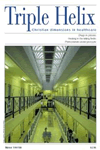'I feel pulled in so many directions. Today I needed to be in several places at once. It's so hard working out who and what should come first.'
My wife was reflecting on another fairly typical day in her work as an NHS speech therapist. Listening to her responses to my 'How did it go today?' these past couple of years has been quite an education. The world of conflicting healthcare demands is now partly my world as well. Many jobs involve balancing priorities but the task seems particularly challenging when the goods at stake are people's health and even their lives.
Thinking about my wife's experience has given me a new appreciation for the biblical incidents described. It's a remarkable story about Jesus being faced with a conflict of demands in healthcare provision. While the episode does not give us a model to be imitated slavishly, it does suggest a pattern of response from which we may be able to draw important principles and encouragement in our own situations.
As is common in Mark's Gospel, the passage tells two stories, with one interposed in the middle of the other. This brings them into a relationship of 'compare and contrast', thereby providing the narrative with a cutting edge. I have been greatly helped in my appreciation of this story by the little book Mark at Work by John Davies and John Vincent[2].
In the inner story, the woman is in a continual and chronic state of haemorrhage, a constant menstruation. She is not only unwell but unclean according to Jewish law, excluded from the community - the religious purity of the respectable requires that the woman be ostracised.
And whose job is it to ensure that the rules are kept and the woman excluded? It is Jairus', the ruler of the synagogue. These two individuals whose interests are fundamentally incompatible are brought face to face in the presence of Jesus.
Davies and Vincent point out some fascinating contrasts between the two:
Jairus
He is in authority in the religious systemHe is a person of privilege in the culture
He is named
He is male, father, surrounded by family
He is a public person who makes a public request, but gets healing in private
The Woman
She is a victim of the religious systemShe is rejected by the culture
She is anonymous
She is female, isolated, with no support
She is a private person who makes a secretive appoach, but gets healing in public
There are also striking differences between the two patients:
The daughter of Jarius
She is 12 years oldShe is an acute emergency
She is at the age of starting to be menstrual
She, the daughter of privilege, has to wait for Jesus' attention
She is restored to a place in the sharing of food in the household
The Woman
She has been losing lifeblood for 12 yearsHer condition is chronic
She is continuously menstrual
She, the outsider, interrupts and Jesus attends to her first
She is restored to a place in the 'shalom', the peace and justice of God
What are some of the principles emerging from this Jesus-encounter that we might apply to our own contexts of competing demands?
Give priority to the marginalised
The person on the margins of society is given priority. As Christians we are to reflect God's particular concern for the poor, the oppressed, the socially excluded. It is 'the least of these' who should be at the top of the list to receive healthcare.
Note the needs of the poor
The privileged person is challenged by the encounter with an outsider. Any healthcare system that increases the likelihood of the better-off being oblivious of the needs of the poor is unbiblical.
Emphasise our unity before God
The privileged and the unprivileged become part of what Davies and Vincent call 'a common fellowship of the healed'. As Christians we must emphasise that 'we are in this together' and that the gospel breaks down socio-economic barriers. Christian prayer and healing ministries can be an effective means of emphasising our unity before God.
Pursue holistic healthcare
Jesus provides a model of holistic medicine. Physical healing is insufficient; there is a spiritual and a communal dimension. The woman must be affirmed in her faith and incorporated into the community; the girl must be nourished physically and relationally.
Be confident that God is with us
We worship a God who has, in Jesus Christ, experienced the challenges of multiple needs and competing demands. We can, therefore, face the challenges of our own professional lives in the power of the Spirit, in the presence of Christ who has been there before us.
































